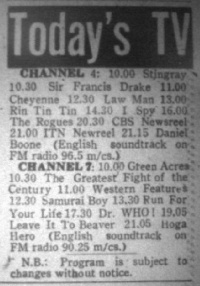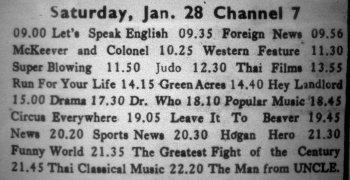Difference between revisions of "Thailand"
Jon Preddle (talk | contribs) |
Jon Preddle (talk | contribs) |
||
| Line 33: | Line 33: | ||
Television is broadcast in a mixture of both Thai and English - the Thai soundtrack was dubbed locally; the original English soundtrack was simulcast on FM radio bands. For channel 4 it was on '''FM radio 96.5 Mcs''', and for Channel 7 it was '''90.25 and 105 mcs'''. | Television is broadcast in a mixture of both Thai and English - the Thai soundtrack was dubbed locally; the original English soundtrack was simulcast on FM radio bands. For channel 4 it was on '''FM radio 96.5 Mcs''', and for Channel 7 it was '''90.25 and 105 mcs'''. | ||
| + | |||
| + | Another common "dubbing" method used by the television stations was for actors to perform the Thai soundtrack live during transmission. Whether this method was utilised on '''Doctor Who''' is unknown. (The fact that Thailand aired [[Marco Polo]] and [[The Reign of Terror]], two stories for which "music / effect" only soundtracks were not available, suggests that "dubbed live" may have been used by channel 7 for these two serials at least.) | ||
| Line 86: | Line 88: | ||
[[Hong Kong]] was the previous [[:Category:Australasia/Asia|Asian]] country to screen the series, so it’s possible that Thailand was sent the same set of William Hartnell prints shortly after transmission in [[Hong Kong]]. | [[Hong Kong]] was the previous [[:Category:Australasia/Asia|Asian]] country to screen the series, so it’s possible that Thailand was sent the same set of William Hartnell prints shortly after transmission in [[Hong Kong]]. | ||
| + | |||
| + | It's equally possible that Thailand was the first country to receive fresh telerecordings (using the Stored Field telerecording method), which the BBC had made in late 1966 / early 1967. | ||
| Line 99: | Line 103: | ||
This would certainly explain the discrepancy of '''twelve''' "additional" episodes during this run. | This would certainly explain the discrepancy of '''twelve''' "additional" episodes during this run. | ||
| + | |||
| + | If the "dubbed as it was transmitted" method was used for the series, it's possible most of the pre-empting was on account of the live recording facilities not always being available on the night. | ||
There is no clear record that Thailand screened '''Doctor Who''' again, even after the switch to PAL colour in 1973. | There is no clear record that Thailand screened '''Doctor Who''' again, even after the switch to PAL colour in 1973. | ||
Revision as of 18:35, 6 December 2012
THAILAND is part of Southeast Asia, and lies at the tip of the peninsula of Malaysia.
Profile
| Country Number (20) | 1966 | FIRST WAVE |
| Region | Australasia/Asia | |
| Television commenced | 1955 | |
| Colour System | 1973 | PAL |
| Population | 1966 | 30 million |
| TV Sets | 1966 | 250,300 |
| Language/s | Thai | Dubbed (simulcast with English) |
Television Stations / Channels
Thailand began its television service in 1955.
Thailand has two television stations: THAI TV, channel 4, a government-owned broadcaster, and The Royal Thai Army Television Company - HSA-TV, channel 7, a privately owned broadcaster, run by the Thai army.
It was on the Army TV channel 7 that Doctor Who aired.
Language/s
The official language of Thailand is Thai, although English is recognised as a secondary language taught in schools.
Television is broadcast in a mixture of both Thai and English - the Thai soundtrack was dubbed locally; the original English soundtrack was simulcast on FM radio bands. For channel 4 it was on FM radio 96.5 Mcs, and for Channel 7 it was 90.25 and 105 mcs.
Another common "dubbing" method used by the television stations was for actors to perform the Thai soundtrack live during transmission. Whether this method was utilised on Doctor Who is unknown. (The fact that Thailand aired Marco Polo and The Reign of Terror, two stories for which "music / effect" only soundtracks were not available, suggests that "dubbed live" may have been used by channel 7 for these two serials at least.)
DOCTOR WHO IN THAILAND
Thailand was the 20th country to screen Doctor Who. It was also the first non-Commonwealth country, and also the first non-English-language nation to screen the series (see Selling Doctor Who).
BBC Records
The Seventies records a sale of "(9)" stories by 28 February 1977. The Handbook identifies these as being: A, C, D, E, F, H, J, K and L.
In DWM, Thailand is identified in 11 story Archives: the same nine as above, plus B and G.
Stories bought and broadcast
WILLIAM HARTNELL
Eleven stories, 53 episodes:
| A | An Unearthly Child | 4 |
| B | The Daleks | 7 |
| C | Inside the Spaceship | 2 |
| D | Marco Polo | 7 |
| E | The Keys of Marinus | 6 |
| F | The Aztecs | 4 |
| G | The Sensorites | 6 |
| H | The Reign of Terror | 6 |
| J | Planet of Giants | 3 |
| K | The Dalek Invasion of Earth | 6 |
| L | The Rescue | 2 |
Thailand therefore bought the standard package of GROUP A, B, and C of the William Hartnell stories.
The programme was supplied as 16mm black and white film prints with English soundtracks.
Origin of the Prints?
Hong Kong was the previous Asian country to screen the series, so it’s possible that Thailand was sent the same set of William Hartnell prints shortly after transmission in Hong Kong.
It's equally possible that Thailand was the first country to receive fresh telerecordings (using the Stored Field telerecording method), which the BBC had made in late 1966 / early 1967.
Transmission
WILLIAM HARTNELL
The series started on Saturday, 20 August 1966, at 5.30pm. It screened weekly at that time, or at 5.28pm for 17 episodes mid-way through the run. There were three weeks in which no episode aired (4 and 11 February 1967, and 30 September). However, the run ended after 68 weeks on 2 December 1967, which means there were 12 "extra" weeks. But it's more likely these are due to pre-emptions rather than repeats or additional episodes sold but not recorded in our main BBC Records sources.
It is noted in the book, Broadcasting in Asia and the Pacific (John A Lent, 1978), it was not uncommon in Thailand that published schedules were "often unrelated to what is aired. Programs run late, or not at all, and substitutions are made without prior notice".
Indeed, the TV listings contain (as they are all want to do) the disclaimer: "N.B.: Program is subject to changes without notice".
This would certainly explain the discrepancy of twelve "additional" episodes during this run.
If the "dubbed as it was transmitted" method was used for the series, it's possible most of the pre-empting was on account of the live recording facilities not always being available on the night.
There is no clear record that Thailand screened Doctor Who again, even after the switch to PAL colour in 1973.
Fate of the Prints?
Thailand was the last of the five Asian countries to air the original 53 episode package of William Hartnell stories.
In November 2008, the world's news agencies went mad with reports that "researcher Damian Finucane" was on the hunt for missing episodes of Doctor Who in Bangkok. Needless to say, nothing positive came from his efforts...
TV listings
| ← AIRDATES ...... (CLICK ICON TO GO TO TABLE SHOWING EPISODE BREAKDOWN AND AIRDATES - N/S = story title is Not Stated) |
TV listings have been obtained from the newspapers, Bangkok Post and Bangkok World. The latter gave the full week's listings in the Wednesday issues.
Listings initially gave the series name as "Dr Who" or "Dr WHO!" (complete with capitalisation and punctuation).
None of the listings had story titles, so we can only assume that the stories aired in the correct order. As noted earlier, there are 12 additional listings for the series – all of which can be attributed to pre-emptions.
At times the Bangkok World would have a different starting time than that given by the Bangkok Post: the example imaged here for 28 January 1967 shows a two-minute divergence from the 17.28 time.
One striking aspect of the listings for "Dr WHO!", is the start and end times – 17.30 to 19.05 in the first example shown here. This shouldn't be read that the programme ran for over 90 minutes! No, the reason for this is, that non-English programmes would also screen during the evening's schedule, but these would understandably not be recorded in the TV listings of English-language newspapers.


